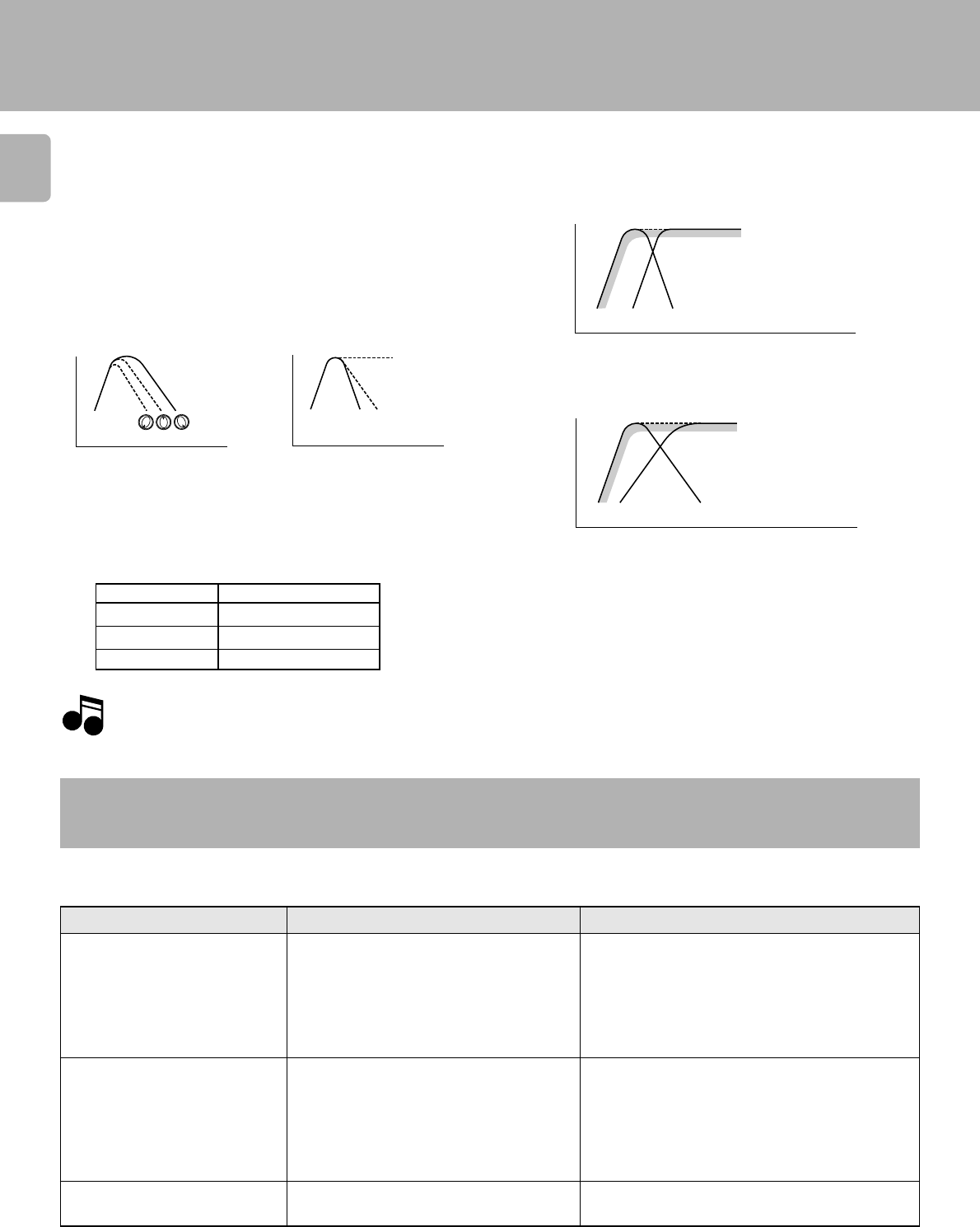
22
FRANÇAIS
DEUTSCH
NEDERLANDS
ITALIANO
ESPAÑOL
SW-505D (EN)
In case of difficulty
Sound adjustment
2 Crossover slope adjustment (SLOPE selector switch)
Front speaker
Bass-reflex type
Depending on the listening room condition and the front speaker characteristics, other adjustment setting than the examples shown above may
provide more natural bass sound and more effective bass reproduction. Try various adjustment settings to select the optimum one for your
listening room.
How to use the VOLUME CONTROL knob,
PHASE select key, CROSSOVER control knob
and SLOPE selector switch
Front speaker Crossover Frequency
Small speaker 120 ~ 200 Hz
Medium speaker 80 ~ 120 Hz
Large speaker 60 ~ 80 Hz
The characteristics above express the images and the details are
different from the actual characteristics.
Frequency Frequency
Sound Pressure Level
Frequency
Sound Pressure Level
Frequency
Front speaker
Acustic Air Suspencion type
Sound Pressure Level
CROSSOVER control knob
Sound Pressure Level
SLOPE selector switch
12dB24dB
12 dB position: To be used when the Subwoofer is combined
with acoustic air-suspension type front speakers.
0 (dB) position: To be used for reproducing sound from the
subwoofer without electrically attenuating the
high-frequency components in the input signal.
Use this position when the high frequencies in
the subwoofer signal have already been cut by
the Dolby Digital or DTS circuitry.
The crossover frequency adjustment is invalid
when this position is set.
The VOLUME CONTROL knob, PHASE select key, CROSSOVER
control knob and SLOPE selector switch can be adjusted to match
the condition of the listening room and/or the characteristics of the
left and right front speakers.
CROSSOVER control knob and SLOPE selec-
tor switch function
Examples of standard adjustment according
to the type of front speakers
1 Crossover frequency adjustment (CROSSOVER control
knob)
24 dB position: To be used when the Subwoofer is combined
with bass-reflex type front speakers.
RemedySymptom Cause
No sound is output.
Sound volume is low.
Radio broadcasts are interfered
with by noise.
÷ The connection cords are not plugged into the
jacks properly.
÷ The volume is set to the minimum.
÷ The connected amplifier or receiver does not
output the subwoofer pre-out signal (appli-
cable when the amplifier or receiver is equipped
with the pre-out on/off function).
÷ The speaker cords are connected in the re-
verse phase.
÷ The phase selection is not correct.
÷ The pre-out signal level of the connected am-
plifier or receiver is set to the minimum (appli-
cable when the amplifier or receiver is equipped
with the pre-out level control function).
÷ The interfered unit is installed near the
subwoofer.
7
0!
7
0!
6
A simple mistake may often be misunderstood as a failure. In case of a trouble, check the applicable symptom
in the following table before calling for service.
0 (dB)
÷ Connect them properly by referring to “Con-
nections”.
÷ Adjust to an optimum volume.
÷ Switch the subwoofer pre-out switch of the
connected amplifier or receiver to ON.
÷ Connect the R and L cords with correct + and
- polarity by referring to “Connections”.
÷ Set the phase to a different phase.
÷ Adjust the pre-out level of the connected am-
plifier or receiver to an optimum level.
÷ Install the subwoofer more apart from the radio
receiver.
NoteNote
Note


















